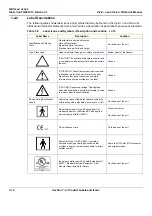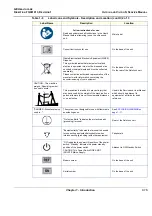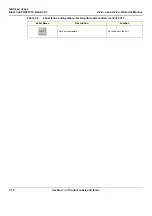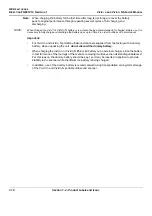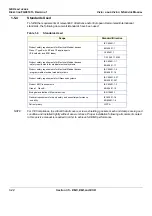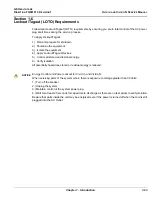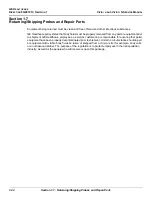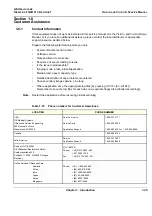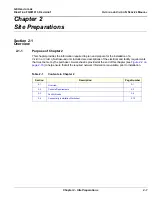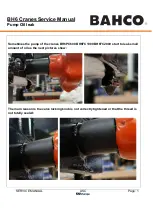
GE H
EALTHCARE
D
IRECTION
FQ091013, R
EVISION
1
V
IVID
I
N
AND
V
IVID
Q
N S
ERVICE
M
ANUAL
Chapter 1 - Introduction
1-17
1-4-3
Vivid
i
n/ Vivid q N Battery Safety
The lithium ion battery provides power when an AC power source is not available. Lithium ion batteries
last longer than conventional batteries and do not require replacement as often. You can expect one
hour of battery life with a single, fully-charged battery.
The lithium ion technology used in the system’s battery is significantly less hazardous to the
environment than the lithium metal technology used in some other batteries (such a watch batteries).
Used batteries should not be placed with common household waste products. Contact local authorities
for the location of a chemical waste collection program nearest you.
NOTE:
Regulations vary for different countries. Dispose of a used battery in accordance with local regulations.
CAUTION:
USE ONLY BATTERIES APPROVED BY GE MEDICAL SYSTEMS AS
SUITABLE FOR USE WITH THE VIVID
I
n and Vivid q N portable ultrasound scanner
WARNING: The Vivid
i
n/ Vivid q N
battery has a safety device.
DO NOT ATTEMPT TO DIS-ASSEMBLE OR ALTER THE BATTERY
!
Always observe the following precautions:
•
Charge batteries only when the ambient temperature is between 0
o
and 65
o
C (32
o
and 149
o
F).
and discharge the batteries between -10
o
and 55
o
C (14
o
and 131
o
F)
•
Do not short-circuit the battery by directly connecting the negative terminals with metal objects.
•
Do not heat the battery or discard it in a fire.
•
Do not expose the battery to temperatures over 60
o
C (140
o
F). Keep the battery away from fire and
other heat sources.
•
Do not charge the battery near a heat source, such as, a fire or heater.
•
Do not leave the battery in direct sunlight.
•
Do not pierce the battery with a sharp object, hit it, or step on it.
•
Do not use a damaged battery.
•
Do not apply solder to a battery.
•
Do not connect the battery to an electrical power outlet.
WARNING: In the event that the Vivid
i
n/Vivid q N portable ultrasound scanner
will not be used for
a long period, it is necessary to remove the battery from the system while not in use.
CAUTION: To prevent the battery bursting, igniting, or fumes from the battery causing
equipment damage, always observe the following precautions:
•
Do not immerse the battery in water or allow it to get wet.
•
Do not place the battery into a microwave oven or pressurized container.
•
If the battery leaks or emits an odor, remove it from all possible flammable sources.
•
If the battery emits an odor or heat, is deformed or discolored, or in a way appears abnormal during
use, recharging or storage,
immediately remove it and stop using it
.
•
If you have any questions about the battery, consult your local GE representative.
•
Storage of the battery pack:
Short term (less than 1 month):
between 0
o
C (32
o
F) and 50
o
C (122
o
F).
Long-term (more than 3 months): between 10
o
C (50
o
F) and 35
o
C (95
o
F)
Note:
When storing a battery pack for more than 6 months, it is necessary to charge the battery
pack at least once every 6 months in order to prevent leakage and deterioration in
performance (as a result of self-discharging).
Содержание FL000090
Страница 2: ......
Страница 30: ...GE HEALTHCARE DIRECTION FQ091013 REVISION 1 VIVID I N AND VIVID Q N SERVICE MANUAL xxviii ...
Страница 739: ......












